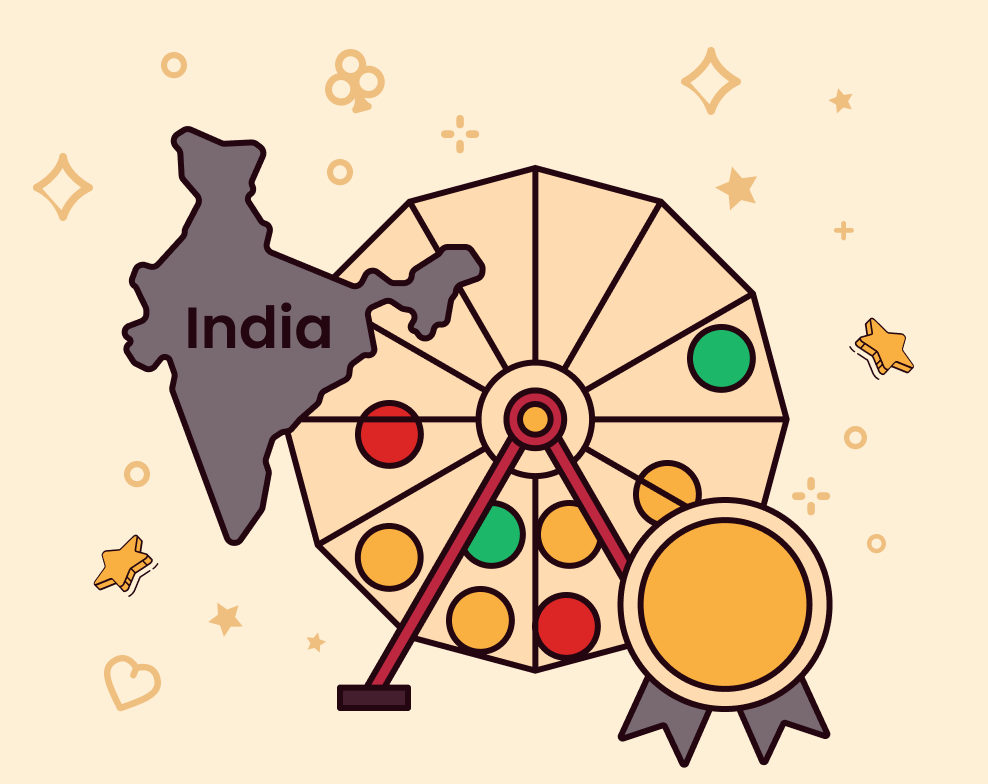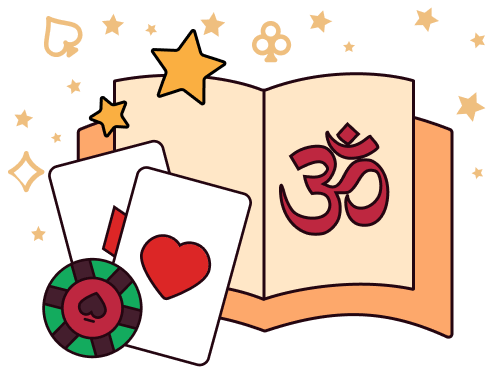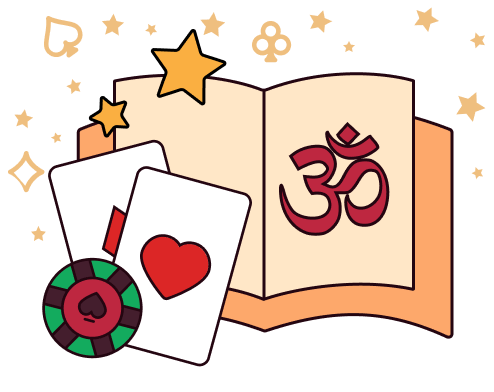
Is the Indian betting scenario banned by state laws or Federal laws? Well, this question may excite many of you. Indian laws are a bit complicated for online sports betting, as they were for Cryptocurrency. However, no Federal Law prohibits any gameplay. A few strict state laws are enacted to safeguard the interests and lives of the punters. The only states to legalize online gambling include Goa, Sikkim, and Daman.
Note: Indian online casino relies on foreign corporations to supply them with online casino games.
An Insight Into Indian Casino Regulations
"Good regulations must be conducive to businesses and customer protection."
As we say, too many regulations and too few can be bad. You cannot throw someone to destroy oneself under the addiction to casinos or ban them from enjoying. However, casino licensing and regulation will help punters choose the right casino. You can play games but responsibly.
The Indian casino scene is regulated by the Public Gaming Act of 1867. 10CRIC is a popular gambling site that the locals frequent. It is the top online cricket betting site. However, the Information Technology Act of 2000 does not mention online gaming activities. A few land-based legal casinos are operating in India. They are particularly based in the states of Sikkim and Goa.
A few laws are already enacted to regulate online gambling, and a few variations have been made.
The Public Gambling Act of 1867 is the central gambling law regulating the online market. It is the oldest law. It handles challenges of online gambling, digital casinos, and gaming.
Gambling in the country is a state subject. The 7th Schedule of the Constitution says that the States in India have to create their gambling laws to regulate the jurisdictions.
States adopt the Public Gambling Act with a few amendments like Madhya Pradesh, Delhi, and Uttar Pradesh. States like Sikkim, Goa, Meghalaya, Daman, and Nagaland have drafted specific laws and regulations for online and land-based gambling.
The Ministry of Electronics and Information Technology has invited comments from the public on the amendments to be made to casino gambling. The final amendments regarding the casino laws were made on April 6, 2023.

Casino Regulations Across Indian States
A Statista report states that India's gambling market will be valued at 135 billion rupees by 2022 and will reach 231 billion rupees by 2025. The annual growth rate shown is 19%. This rising trend shows how the Indian gambling market is flourishing.
Let us walk you through the regulations different Indian states have updated following the gambling rules.
Sikkim
Under the provisions of the Sikkim Online Gaming Act, 2008, or the Sikkim Act, the state offers table games like Blackjack and Roulette. The condition for providing gambling games was that they should be provided through the intranet. Gaming is controlled by the authorities like the Finance, Revenue, and Expenditure Department. However, in 2008 the state introduced a Sikkim Online Gaming Regulation Act and the Sikkim Online Act for the games like Bingo and Punto Banco.
Telangana
The state, under the Gambling Act, prohibits the games of stakes as well as the games of skill. The State of Telangana will now introduce a new gambling law to curb the menace of online gambling. This draft law will have government representatives, retired judges, and a few industry representatives on the panel to check whether it's a game of chance or skill.
Maharashtra
In March 2022, the government of Maharashtra took the step to amend the Maharashtra Prevention of Gambling Act, 1887, to address the problem of online gaming specifically.
Rajasthan
The State of Rajasthan has recently introduced the Rajasthan Virtual Online Sports Regulation Bill, 2022. This draft bill will help propose the licensing regime for regulating eSports, fantasy sports, and derivative formats. These regulations do not include other skill games like virtual stock games, poker, and quiz games. However, authorized casino websites can provide these games.
Tamil Nadu
The Madras High Court has already withdrawn petitions against the Tamil Nadu State Ordinance. It bans online gaming and gambling. The State government has already cleared that the Ordinance is not in effect yet. There are a few regulatory issues that have grown in the State over the banning of online games.
Recently, the Tamil Nadu State was in the news because it passed an ordinance and the Bill in the assembly to prohibit online gaming and gambling. It also includes banning Rummy and Poker. It has become one of the few Indian states to pass a law to ban gambling completely. The Tamil Nadu Bill seeks the regulation of online gambling, prohibiting the game of chance, or skill, involving an element of chance or event generation.
Meghalaya
In March 2021, the State passed the Meghalaya Regulation of Gaming Act 2021 and the Meghalaya Regulation of the Gaming Rules 2021. It is collectively known as the Meghalaya Law. It regulates the games of skill and chance. The games that are played through the intranet came under this rule. In October 2022, the Meghalaya Chief Minister repealed the Meghalaya Law because the Church thought it immoral. An ordinance was passed in November 2022 to repeal the Meghalaya Law. The law provisions are not discussed in this chapter.
Apart from this, the states like Nagaland, Delhi, Daman, and Goa allow specific gambling games for gameplay, especially poker.
Casino regulations and big variations are major mainstays that affect the Indian casino market. You have to find out whether it is regulated or not. Most casinos you will log into are from the foreign market. In this scenario, go through the terms and conditions to safeguard your hard-earned money. Do not take a step in haste! Get to the best expert sites to read how to find a regulated and legit casino.

The Latest News


Ana D.
•May 30, 2024
Lotteries and other forms of gambling have a colourful history in India. While lotteries are regulated under a central umbrella, how they are managed is subject to the discretion of state governments. However, the growing popularity of lotteries saw the Lotteries (Regulation) Act of 1998 and the Lotteries (Regulation) Rules 2010 introduced, which established detailed standards for the governments to follow.
Currently, lottery games are legal in 13 Indian states, though anyone of legal gambling age in India can buy international lottery tickets online. The ticket prices and prize pools of government lotteries in India vary depending on the lottery scheme and state in which it is regulated. Tickets for weekly draws begin at modest prices like ₹2 or ₹5 and increase for bumper draws and special schemes.


Akil Khan
•March 21, 2024
Whether you like it or not, luck plays a crucial role in gambling. And while many would argue that it’s an unreliable force, for many Indians, the ancient tradition of Vedic astrology offers a way to understand how luck works in the universe and how one could potentially manipulate it to work in one’s favour.
Vedic astrology (known as Jyotish in Sanskrit) is the practice of studying planetary positions, celestial influences, and karmic patterns to understand how these influence and shape human lives and destinies.
When it comes to gambling, some Indians look to Vedic astrology to boost their chances of success. By analysing astrological charts and horoscopes, and identifying cosmic connections, gamblers seek to find the most advantageous time to gamble, looking for lucky combinations of numbers, or even charms and rituals to help improve their chances.
Let’s look at this more closely:
Planetary configurations
"Muhurtha", an essential principle of Vedic astrology, indicates the opportune time to partake in certain activities based on planetary configurations. It also highlights when best to avoid certain activities. So, in the case of gambling, a player would wait for a favourable Muhurtha to maximise their chances of success.
Presence of the planets
Vedic astrology focuses on nine “grahas”, which are collectively referred to as the “navagrahas” (nava meaning nine). They include the sun (Surya), moon (Chandra), Mars (Mangala), Mercury (Budha), Jupiter (Brihaspati), Venus (Shukra), Saturn (Shani), Rahu (north node of the moon), and Ketu (south node of the moon). According to Vedic astrology, the planet Venus offers luxury and Jupiter provides immense wealth. A conjunction of Jupiter and Venus unafflicted with the moon is therefore said to bring good luck and prosperity.
Birth charts
Many Indians strongly believe in analysing their birth chart in every aspect of their life. This comes from Vedic astrology, which argues that the alignment of different celestial bodies at your birth can provide invaluable insights. In the case of betting, it could highlight a person’s gambling and risk-taking tendencies and subsequent strategies they could employ to maximise their chances of winning, translating into profits and success.
Astrology and numerology
Hindus love to rely on their favourite numbers, particularly when it comes to gambling, and generally prefer odd numbers over even. Seven and eight are considered auspicious numbers, representing success and prosperity. Many Hindus also use these numbers at the time of Diwali when, in some houses, gambling is a ritual. Another lucky sequence of numbers in Hinduism is 786, representing the Trinity of Brahma, Vishnu, and Shiva.


Akil Khan
•March 21, 2024
In casinos, we often hear phrases like good luck and good fortune. Not surprising, really, given how the majority of casino games are based primarily on chance, though some would claim that success is also down to mathematics and algorithms.
In any case, luck plays a crucial role in gambling, and many gamblers will have their own rituals they perform before games or even lucky charms they carry to improve their chances of winning.
Hinduism, one of the oldest practising religions in the world, believes in positive and negative energy, which could define your moves and outcomes. Furthermore, there are several ways one can channel these energies, whether through prayer or certain objects such as charms or symbols. We shall discuss these in more detail below.